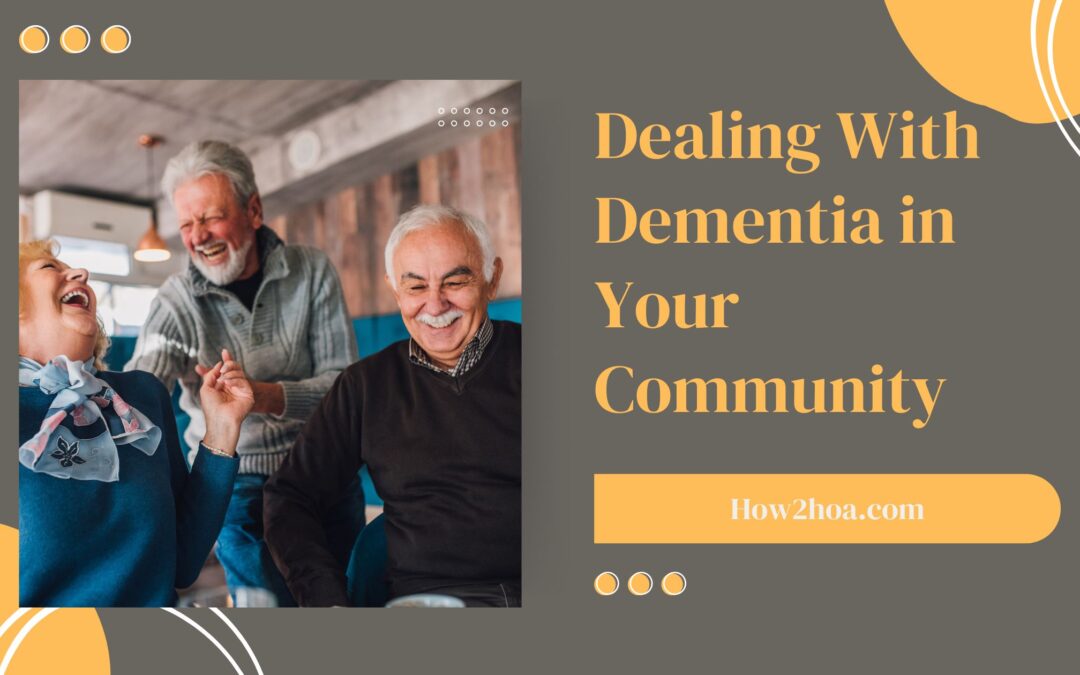Do You Have Dementia in Your Community?
Let’s discuss a scenario that might occur in the average neighborhood anywhere in America. A couple in your community has taken in one of their aging parents, who is now living on their home. One day, the elderly parent leaves the house and becomes disoriented, wandering around the neighborhood in an attempt to find their way home. They come across some children playing in the street and accidentally frighten the children in their confusion and desperation to find their home. The children’s parents are now looking to the HOA board to do something about the situation.
If you’re a member of your community’s HOA, determining a sensitive but effective way of dealing with issues like this will be your responsibility. Diseases like dementia or Alzheimer’s are a tragically common occurrence, and communities often must find a balance between protecting the sufferers as well as members of the community surrounding them.
Let’s look at some of the reasons why an HOA board may need to get involved in cases like this. Then we’ll discuss some effective steps you can take to handle the situation sensitively and proactively so that everyone in your community is happy.
Examples of Issues That Might Require HOA Involvement
Here are some potential scenarios involving dementia or Alzheimer’s patients in your community that might require your HOA to act.
The Risk to Self or Others
The most important part of your job as HOA members is to keep your residents safe. If there is a clear risk to either the individual or the community, it’s your responsibility to act—now. Don’t wait until something irreversible takes place before taking steps to ensure your residents’ safety.
Risk of Loss or Damage to Property
Physical harm isn’t the only risk at play here. A disoriented individual can lead to damage or loss of property in the community. This can also include issues of privacy. There have been many recorded cases of Alzheimer’s or dementia patients taking the wrong mail, opening it, and throwing it away. As you can imagine, this is something that can’t be allowed to take place in your community.
Unease in Community
A general feeling of concern and uneasiness can be a real issue in your community. Your residents might want to deal with the individual sensitively, but not know how. They might also be concerned about their responsibility to keep this person safe and secure, which shouldn’t fall to them. It can lead to a tense feeling around your neighborhood.
HOA Steps to Take
If you encounter any of these issues as part of your HOA board, there are some steps you can take to help keep your residents safe and content. Overall, you’ll need to use your best judgment and sensitivity when determining the best course of action to take that will deal with the problem without leading to offense.
Keep a Log
This is absolutely vital, particularly if things escalate to legal proceedings later on. Keep a log of every resident report, incident, contact with the individual or family, and anything else relating to the situation. This will be vital in showing the steps you’ve taken later on.
Contact Family About Concerns
Your first point of contact should be the community member’s family. Let them know that an incident has occurred and that members of the community are concerned. This gives them a chance to acknowledge the issue and hopefully offer steps they can take to provide a solution.
Take Concrete Steps
If an incident has occurred, there will likely be pressure from your community to act. Address their concerns by taking concrete steps, like having the family sign a document accepting their responsibilities in keeping the individual safe and secure.
Contact Adult Protective Services
If the family refuses to take action, it’s your responsibility to contact Adult Protective Services and let them know about an unsafe situation.
Inform Residents
If issues persist, keep your residents informed. They should never be surprised by an incident that’s been brewing for some time. You can provide them with tips should they encounter the individual in the community, and how best to move forward.
Court Proceedings
While court proceedings in these cases are rare, they do occur. They can result from either the family refusing to act or the community taking action themselves. This is why keeping a log of everything that’s transpired is so vital. You may need to prove that your HOA has taken all possible and necessary steps to handle the issue.
Dealing with aging members of your community and associated diseases that can lead to confusion or disorientation isn’t easy. It can be a difficult subject to approach with the individual or family. Meanwhile, members of your community might feel concerned or even unsafe.
If you follow some of the council in this short guide, you’ll have a good head start in understanding the best course of action and handling the situation with sophistication and success.

